Related Research Articles

Gioachino Antonio Rossini was an Italian composer who gained fame for his 39 operas, although he also wrote many songs, some chamber music and piano pieces, and some sacred music. He set new standards for both comic and serious opera before retiring from large-scale composition while still in his thirties, at the height of his popularity.

George FridericHandel was a German-British Baroque composer well known for his operas, oratorios, anthems, concerti grossi, and organ concertos. Handel received his training in Halle and worked as a composer in Hamburg and Italy before settling in London in 1712, where he spent the bulk of his career and became a naturalised British subject in 1727. He was strongly influenced both by the middle-German polyphonic choral tradition and by composers of the Italian Baroque. In turn, Handel's music forms one of the peaks of the "high baroque" style, bringing Italian opera to its highest development, creating the genres of English oratorio and organ concerto, and introducing a new style into English church music. He is consistently recognized as one of the greatest composers of his age.

Giovanni Pierluigi da Palestrina was an Italian composer of late Renaissance music. The central representative of the Roman School, with Orlande de Lassus and Tomás Luis de Victoria, Palestrina is considered the leading composer of late 16th-century Europe.
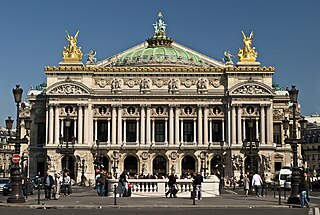
Opera is a form of theatre in which music is a fundamental component and dramatic roles are taken by singers. Such a "work" is typically a collaboration between a composer and a librettist and incorporates a number of the performing arts, such as acting, scenery, costume, and sometimes dance or ballet. The performance is typically given in an opera house, accompanied by an orchestra or smaller musical ensemble, which since the early 19th century has been led by a conductor. Although musical theatre is closely related to opera, the two are considered to be distinct from one another.

Giovanni Battista Draghi, often referred to as Giovanni Battista Pergolesi, was an Italian Baroque composer, violinist, and organist, leading exponent of the Baroque; he is considered one of the greatest Italian musicians of the first half of the 18th century and one of the most important representatives of the Neapolitan school.

Josquin Lebloitte dit des Prez was a composer of High Renaissance music, who is variously described as French or Franco-Flemish. Considered one of the greatest composers of the Renaissance, he was a central figure of the Franco-Flemish School and had a profound influence on the music of 16th-century Europe. Building on the work of his predecessors Guillaume Du Fay and Johannes Ockeghem, he developed a complex style of expressive—and often imitative—movement between independent voices (polyphony) which informs much of his work. He further emphasized the relationship between text and music, and departed from the early Renaissance tendency towards lengthy melismatic lines on a single syllable, preferring to use shorter, repeated motifs between voices. Josquin was a singer, and his compositions are mainly vocal. They include masses, motets and secular chansons.
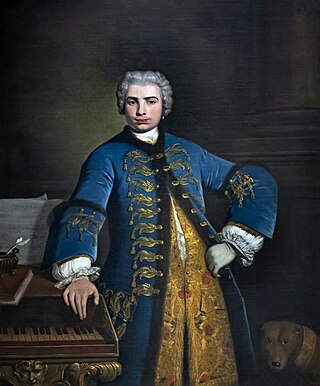
Farinelli was the stage name of Carlo Maria Michelangelo Nicola Broschi, a celebrated Italian castrato singer of the 18th century and one of the greatest singers in the history of opera. Farinelli has been described as having had soprano vocal range and as having sung the highest note customary at the time, C6.

A composer is a person who writes music. The term is especially used to indicate composers of Western classical music, or those who are composers by occupation. Many composers are, or were, also skilled performers of music.

Johann Adolph Hasse was an 18th-century German composer, singer and teacher of music. Immensely popular in his time, Hasse was best known for his prolific operatic output, though he also composed a considerable quantity of sacred music. Married to soprano Faustina Bordoni and a friend of librettist Pietro Metastasio, whose libretti he frequently set, Hasse was a pivotal figure in the development of opera seria and 18th-century music.

John Dunstaple was an English composer whose music helped inaugurate the transition from the medieval to the Renaissance periods. The central proponent of the Contenance angloise style, Dunstaple was the leading English composer of his time, and is often coupled with William Byrd and Henry Purcell as England's most important early music composers. His surviving music is exclusively vocal, and frequently uses isorhythms, while pioneering the prominent use of harmonies with thirds and sixths. His style would have an immense influence on the subsequent music of continental Europe, inspiring composers such as Du Fay, Binchois, Ockeghem and Busnois.

A madrigal is a form of secular vocal music most typical of the Renaissance and early Baroque (1600–1750) periods, although revisited by some later European composers. The polyphonic madrigal is unaccompanied, and the number of voices varies from two to eight, but usually features three to six voices, whilst the metre of the madrigal varies between two or three tercets, followed by one or two couplets. Unlike the verse-repeating strophic forms sung to the same music, most madrigals are through-composed, featuring different music for each stanza of lyrics, whereby the composer expresses the emotions contained in each line and in single words of the poem being sung.
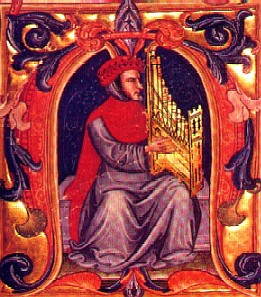
Francesco Landini was an Italian composer, poet, organist, singer and instrument maker who was a central figure of the Trecento style in late Medieval music. One of the most revered composers of the second half of the 14th century, he was by far the most famous composer in Italy.

Dmytro Stepanovich Bortniansky was a Ukrainian composer of Ukrainian Cossack origin. He was a composer, harpsichordist and conductor who served at the court of Catherine the Great. Bortniansky was critical to the musical history of both Ukraine and Russia, with both nations claiming him as their own.

Luca Marenzio was an Italian composer and singer of the late Renaissance.

Neoclassicism in music was a twentieth-century trend, particularly current in the interwar period, in which composers sought to return to aesthetic precepts associated with the broadly defined concept of "classicism", namely order, balance, clarity, economy, and emotional restraint. As such, neoclassicism was a reaction against the unrestrained emotionalism and perceived formlessness of late Romanticism, as well as a "call to order" after the experimental ferment of the first two decades of the twentieth century. The neoclassical impulse found its expression in such features as the use of pared-down performing forces, an emphasis on rhythm and on contrapuntal texture, an updated or expanded tonal harmony, and a concentration on absolute music as opposed to Romantic program music.
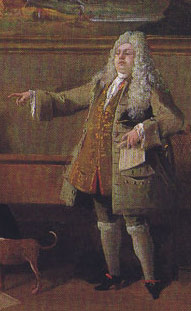
Nicolò Francesco Leonardo Grimaldi was an Italian mezzo-soprano castrato who is best remembered today for his association with the composer George Frideric Handel, in two of whose early operas he sang. Grimaldi was usually known by his stage name of Nicolini.
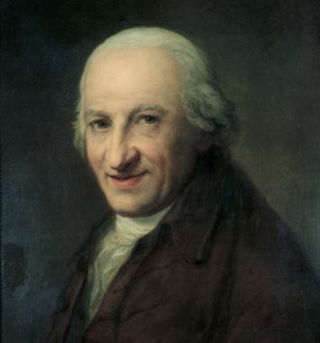
Carl Friedrich Christian Fasch (1736–1800) was a German composer and harpsichordist. Born in Zerbst, he was the son of the composer Johann Friedrich Fasch. He was initially taught by his father.
William Savage was an English composer, organist, and singer of the 18th century. He sang as a boy treble and alto, a countertenor, and as a bass. He is best remembered for his association with the composer George Frideric Handel, in whose oratorios Savage sang.
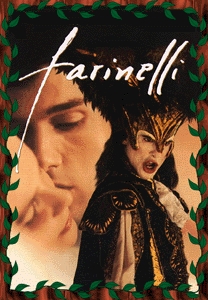
Farinelli is a 1994 internationally co-produced biographical drama film directed by Gérard Corbiau and starring Stefano Dionisi, Enrico Lo Verso, Elsa Zylberstein, and Jeroen Krabbé. It centers on the life and career of the 18th-century Italian opera singer Carlo Broschi, known as Farinelli, considered the greatest castrato singer of all time; as well as his relationship with his brother, the composer Riccardo Broschi.

The Handel organ concertos, Op. 4, HWV 289–294, are six organ concertos for chamber organ and orchestra composed by George Frideric Handel in London between 1735 and 1736 and published in 1738 by the printing company of John Walsh. Written as interludes in performances of oratorios in Covent Garden, they were the first works of their kind for this combination of instruments and served as a model for later composers.
References
Notes
Citations
- ↑ Mattfield, Julius (March 1919). "A Male Precursor of the Galli-Curci". The Lotus Magazine. 10 (3): 124–128. JSTOR 20544089.
- ↑ Niecks, Fr. (1 December 1888). "Les Folies d'Espagne: A Study". The Musical Times and Singing Class Circular . 29 (55): 717–721. doi:10.2307/3360152. JSTOR 3360152.
Attribution
![]() This article incorporates text from this source, which is in the public domain :Grove, Sir George (1908). Grove's Dictionary of Music and Musicians . Vol. 2. New York, McMillan. p. 8.
This article incorporates text from this source, which is in the public domain :Grove, Sir George (1908). Grove's Dictionary of Music and Musicians . Vol. 2. New York, McMillan. p. 8.